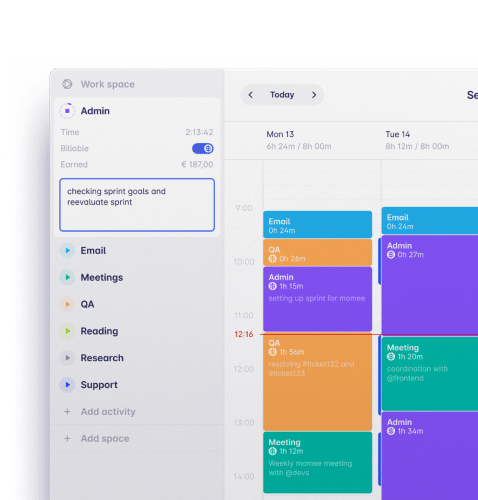Project Cost Tracking: 9 Ways to Track Project Expenses
In today’s business environment, optimizing project cost tracking can be challenging. Issues arise from inaccurate monitoring, poor management, and a lack of real-time visibility into cost data.
This article provides solutions to streamline the process, allowing you to control budgets, predict costs, and deliver accurate cost reports to stakeholders. Gain proficiency in project cost tracking and alleviate associated pains.
Throughout this guide, you’ll learn what’s behind the project cost tracking definition, why it is important, and how to track it with a number of methods.

Free eBook: The Project Manager’s Handbook on Time Tracking
Get your step-by-step guide to master time tracking as a Project Manager
What is project cost tracking?
Project cost tracking is the systematic process of monitoring, recording, and analyzing expenses that occur over the entire duration of a given project. It involves meticulous tracking and documentation of financial transactions to gain insights into resource allocation, utilization, and cost analysis, enabling informed decision-making.
Why is project cost tracking so important?
Project cost tracking is one of the most important indicators of successful project management. It doesn’t only guarantee financial stability but also enables you to make informed decisions impacting the course of your project.
Here are the top reasons why project cost tracking is so important to develop your business:
Budget control
Project cost tracking is crucial for project budget control as it provides real-time visibility into the financial aspects of a project. By accurately monitoring and recording expenses, organizations can:
- Track their spending against the allocated budget,
- Identify potential cost overruns or deviations,
- Take proactive measures to mitigate risks.
This enables effective budget control, allowing stakeholders to make informed decisions, optimize resource allocation, and ensure the project remains on track financially.

Keep your projects’ time and budgets safe with Timeular, the most accurate time tracking solution
Financial accuracy
Project cost tracking is essential for maintaining financial accuracy as it enables organizations to track and record expenses in a detailed and systematic manner. By diligently tracking project costs, organizations can ensure that financial data is accurate, reliable, and aligned with actual project expenditures.
This accuracy provides a solid foundation for financial reporting, forecasting, and decision-making, fostering transparency and accountability throughout the project lifecycle.
Informed decision-making
Project cost tracking is critical for informed decision-making as it provides organizations with comprehensive insights into the financial aspects of a project.
By having a clear understanding of project expenses and cost trends, stakeholders can make data-driven decisions regarding resource allocation, budget adjustments, and project prioritization, ultimately maximizing the efficiency and success of the project.

Data is key to making the best decisions. Start tracking time to drive yours
“Since we started using Timeular and tracking our time, we’ve never made another mistake in planning, creating accurate proposals or budgeting for clients” – AC Coppens, Founder of THE CATALYSTS
Optimization of resources
Project cost tracking is essential for optimizing resources as it allows organizations to identify areas where resources are being misused or underutilized.
Through careful analysis, managers can eliminate obstacles, optimize processes, and strategically reallocate resources, leading to improved resource utilization, cost reduction, and overall performance growth.
Established communication
Project cost tracking is vital for establishing effective communication as it ensures that all parties involved in the project are kept informed of any developments related to project expenses.
By preparing comprehensive and detailed reports for team members, stakeholders, and clients, transparent communication is facilitated, fostering trust, support, and a seamless flow of information throughout the project lifecycle.
Performance evaluation
Project cost tracking is essential for evaluating and optimizing project performance. By comparing costs against planned budgets, it enables an understanding of the project’s health, identifies areas of improvement, and supports informed decision-making.
Overall, project cost tracking contributes to financial control, effective communication, and enhanced performance evaluation, leading to project success.

9 methods on how to track project expenses
One of the duties of a project manager is to track project expenses. Various methodologies exist, each offering unique features and capabilities that may or may not align with your specific needs. Explore and select a suitable method that best aligns with your individual processes and preferences.
Scroll down and find out the 9 effective methods for project cost tracking:
1. Project management time tracking
Project management time tracking entails analyzing tasks and project progress, accurately recording time spent, optimizing resource utilization, and ensuring projects remain on schedule and within budget.
The most effective approach to achieve this is through the utilization of time-tracking software, which primarily facilitates transparent cost tracking by accurately monitoring billable hours.

Free eBook: The Project Manager’s Handbook on Time Tracking
Get your step-by-step guide to master time tracking as a Project Manager
Sophisticated software solutions like Timeular offer the precise time tracking data necessary for comprehensive project expense and budget monitoring. By leveraging this well-organized system and comprehensive reporting capabilities, you gain insights into time allocation for project tasks and can effectively calculate costs.
Time tracking plays a pivotal role in accurately predicting budgets for client presentations and calculating billings for different projects. Equipped with such features, you can confidently master project cost tracking.
Goal: Harnessing the power of time tracking software to seamlessly track billable hours and enable efficient cost tracking.

Track time accurately with zero effort
“We have become 20% more profitable because everyone is in the habit of time tracking” – Richard Wingfield, Head Geek at Envision Design
Advantages
- Accurate and detailed project cost tracking;
- Deep insights about resource utilization and potential inefficiencies;
- Measurement of productivity and efficiency in every team member;
- Time tracking data for accurate project cost estimation and budget planning;
- Better cost control and comparison with past budgets;
- Proper billing to clients;
- Promotion of transparency and accountability that leads to trust from stakeholders, clients and team members.
2. Expense tracking software
Any expense tracking software or tool shares features that record, categorize, and monitor all of the added project expenses. You’ll benefit from real-time visibility, automated data entry, expense approval workflows, and reporting.
Goal: Software that monitors and categorizes all of the projects’ expenses
Advantages
- Improved accuracy on expense monitoring;
- Integration with popular financial systems;
- Detailed reporting and useful insights for decision-making;
- Categorization and assignment of every declared expense.
3. Accounting systems integration
With project management software, you’re able to integrate accounting systems, such as QuickBooks or SAP, so that you uniformize the collection of project expenses. You can have an automatic synchronization of financial data and consequential accuracy of cost tracking.
Goal: Solution that integrates project management software with accounting tools
Advantages
- Elimination of manual data entry and errors that may happen;
- Real-time visibility into project costs and financial performance;
- Financial control and budget management;
- Cost allocation and resource tracking.
4. Expense reports
It’s established a standardized process for everyone involved to submit thorough expense reports with clear insights.
Providing expense reports by team facilitates effective tracking of project expenses by consolidating and organizing expenditures associated with specific teams or departments.
This enables a comprehensive overview of expenses incurred by different teams, allowing project managers and stakeholders to identify trends, analyze spending patterns, and make informed decisions regarding resource allocation and cost optimization.
Goal: Submission of detailed expense reports
Advantages
- Universal template to document expenses;
- Clear visualization of amounts, dates, descriptions, and categories of the expenses;
- Promotes collaboration and communication between all of the team members;
- Helps to discover possible obstacles and errors within the expenses.

5. Requirement of invoices
Require the use of purchase orders for procuring goods and services related to the project.
Maintain a systematic process for tracking and reconciling invoices against purchase orders, ensuring that all expenses are properly recorded and accounted for.
Goal: Collection of all of the invoices and purchase orders
Advantages
- Controlled search of invoices and purchase orders;
- Simplifies the communication with the vendor and the client;
- Makes sure that a potential audit offers financial transparency;
- Improves financial control over expenses and budgets.
6. Expense categories
Manage to create an expense category and code so that you can easily distinguish the different types of expenses such as labor, travel, equipment, and much more. You’ll have a more organized system that enables a simpler analysis.
Goal: Categorization of expenses
Advantages
- Categories improve the organization of expenses;
- Enables budget planning;
- Delivers effective and transparent communication between everyone involved;
- Great contribution for benchmarking and comparison of expenses throughout.
7. Periodic expense reviews
Periodic reviews of expenses intend to monitor trends, potential errors, and obstacles that may appear on the budget. You can analyze those insights carefully and decide what’s working out and what needs to be optimized.
Goal: Reviews expenses periodically
Advantages
- Helps to identify areas of overspending;
- Discover cost-saving opportunities;
- Promotes communication and trust amongst clients, stakeholders, and team members;
- Achievement of financial transparency.
8. Project reports
For this method, you must invest your time in creating visually stimulating reports and dashboards that represent real-time insights on cost tracking. It projects a quick and easy assessment and comprehension of the displayed data, which leads to informed decision-making.
Goal: Creation of visual reports and dashboards that demonstrate real-time cost tracking
Advantages
- Clear overview of the project’s progress;
- Reports that are generated create a collection of great documentation to help on future projects;
- Possibility of tracking project timelines and prediction of potential budgets and expenses;
- Identification of patterns and errors that may be encountered on the insights.
Read also: How to track project management tasks
9. Constant communication
By maintaining open and regular lines of communication among project stakeholders, team members, and decision-makers, there is a continuous flow of information regarding budget allocations, expenditures, financial milestones, and any potential changes or risks that may impact project costs.
This ongoing communication allows for proactive monitoring, timely cost analysis, and informed decision-making, ensuring that project costs are effectively tracked, controlled, and managed throughout the project lifecycle.
Goal: Constant communication about cost tracking between everyone involved in the project
Communications apps
Find the best team communication tools to keep everyone in the loop.
Advantages
- Sense of trust amongst everyone involved;
- Promotion of collaboration and synergy towards the focus point which is cost tracking;
- It leads to effective task delegation and coordination so that everyone knows which task to tackle;
- Prevention and/or elimination of potential errors and obstacles.
Each one of these methods stands as a potential contribution to help with project cost tracking. Either way, you’ll have an implementation of an organized system that will bring you financial transparency.
Conclusion
Mastery of project cost tracking is of utmost importance for establishing financial transparency within your project, stakeholders, team members, and clients. By employing effective project management techniques and utilizing tools like Timeular, which offer transparent time tracking and other impactful features, you can accurately monitor expenses and gain a comprehensive overview of project performance.
Applying the above-mentioned project management techniques fosters trust and communication among all involved parties. Furthermore, it empowers you to exercise control over budgets, preventing inflated costs and overcoming obstacles along the way. Ultimately, this paves the way for optimization, prioritization, and subsequent success in every project, while enabling improved, informed, and quick decision-making driven by financial transparency and budget control.
You might be interested in: